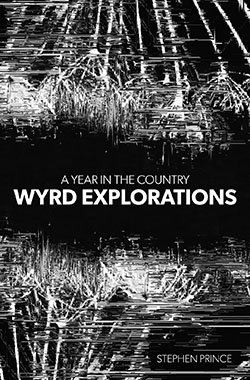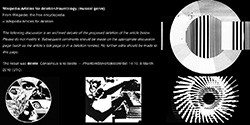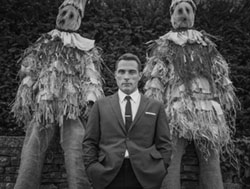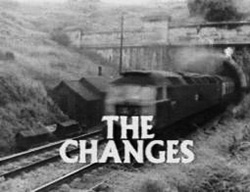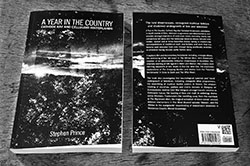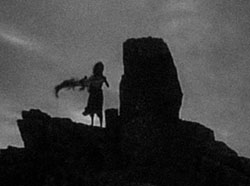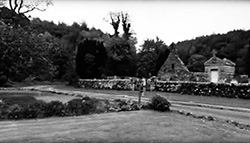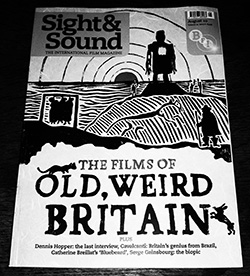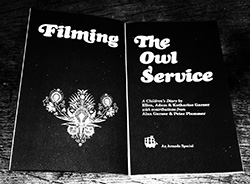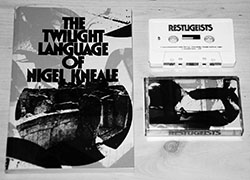

File under: Trails and Influences: Recent Explorations. Case #26/52.
I seem to have a curious ability to come across a certain kind of time-limited electronic ether funding appeal to the general public for creative projects (or crowd funding, to use the modern terminology) just after they’ve ended…
…By Our Selves was one of those, a film by Andrew Kotting and Iain Sinclair (who formerly collaborated on another filmic journey which involved waterways, a pedal driven swan-boat and journeys to the once games of the gods)…
…at which point I step onto another interconnected pathway for a moment or two…
I might be wrong but I expect the period we’re currently living in will be looked back upon as a time of transition as concerns the way that creative projects are funded and their creators try to keep the cupboards, if not full, at least not heading towards empty. Such forms of funding as the one used in this instance are a useful tool but also possibly one of the signs of a system that is out of balance, as the machinery/systems associated with the transmission and replication of such work has changed but the associated forms of cupboard filling have not kept pace.
This has lead to a patchwork of ways of going about such things, none of which quite address the central issue that in the current system there is access to culture via cheap (if sometimes unlicensed) forms through this new machinery but at the same time there has been a lack of building equitable, viable structures to pay for the actual core of things; the story contained in the film, album etc.
(I say cheap rather than free and mention equitable as pockets are routinely delved into/it is expected that they will be for transmission systems and machinery.)
Advance funding appeals to an audience/the general or niche public aren’t necessarily a new idea (I first came across a similar payment in advance funding system for an album a fair few spins round the sun ago and the longstanding cultural institution of Einstürzende Neubauten used a similar idea a while or so ago – as documented by Ms Danielle de Picciotto) it’s just that the technology has changed and now allows for such things to be carried out more easily…
…though ironically, in part the technology that has required the use of such systems by changing/making nolonger as viable previous models of funding, is the same as that which such systems use: the world has become heavily populated with easily accessible digital copying machines and transmission systems, which both giveth and taketh away. Or to semi-quote Mr Luke Haines, the old saying which used to be pram in the hall, art out the door has become electronic ether in the corner, art out the door…
…well, at least as applies in part to people being paid for/funding their creative work.
It would seem that the providers of said digital copying machines and their associated transmission systems/forums are filling their boots as it were, while curiously managing to avoid paying up very much at all for all the cultural input their systems receive and are made appealing and useful by (see Day #218/365 for more on such things)
Accompanying which, there is a curious contemporary and historical avoidance by institutional governing bodies in properly dealing with all this at anything like a quick-step pace (at this point I should probably say that this is not a call for draconian stamping out of particular kinds of behaviour, even if that was especially likely/practical/wished for; see putting genies back in the bottle in but a moment).
Once upon a time music could be replicated in an unlicensed manner via the whirring of ferrous reels and magnets – what was such technology for? All those millions upon millions of such things and their apparatus possibly weren’t for sending audio letter messages to aunties in far-flung climes or making “backup” copies of music you’d bought.
Although apart from the occasional largely ineffective complaint, slogan and rather fine logo, they were accepted as a legitimate part of business practise/personal use (though there was a nominal levy applied on them, which was intended for but I expect didn’t arrive at the doors of, creative working folk). Their zero and ones replacements, despite occasional equally ineffective hand-wringing calls to arms, seem thus far to have slipped through some kind of similar legislative/cultural/societal loophole but without any even nominal attempt at balancing things out.
This is also not a new story but part of an ongoing, seesawing, to-ing and fro-ing
If you look back at one of the earliest examples of when song-smithery/creative work was represented and replicated via zeros and ones, pianolas (mechanical pianos that played music recorded on hole-punched rolls of paper), you can see that initially there was little or no recompense to those who created the music. So the ruling bodies of the day imposed a levy on each roll produced that was meant to alleviate this problem and, in intention at least, meant to recompense those who created the culture which made the systems/machinery work and worthwhile.
Isn’t this part of what ruling bodies are meant to do? Mediate when systems go out of kilter/become unbalanced.
To quote a Mr Nika Aldrich:
“Technology is continuing to expand the number and quality of copies people can make, and when it gets to the point that it limits the incentive to create, Congress steps in and adjusts the balance. As they do that, it shifts the balance intellectual property laws are always trying to strike between incentives to create new content and the ability to use existing content in new ways.”
It’s pretty hard to put the genie back in the bottle, even if that should be something that the majority of people would like (which it is not I expect in this case) but you can maybe check that the benefits of the granted wishes are dealt with and passed out in an equitable manner.
(As an aside and loosely connected, the introduction of safety, pollution, working, health etc regulations/provisions/statutes after the earlier untrammelled developments of the industrial revolution in the UK meant that the population – ie those who worked in the aforementioned industries – was not all that fit to be just that, a working population. It wasn’t purely motivated via altruism – it’s hard to be a grasping capitalist when you’re drinking water polluted by your own output and your workers are too sick/injured/disgruntled to work. So governing bodies stepped in to mediate and re-balance the system, which actually meant a generally overall smoother working system for most concerned. A little common sense can hopefully go a long way.)
This page isn’t meant to be all doom and gloom mind nor is it a call for stasis or reversal. Rather it is some kind of consideration of ways in which cupboard filling can be undertaken when dreaming, story telling and pondering amongst new systems (that as said earlier, giveth and taketh) takes places. Cupboard filling that doesn’t have to hope for/is overly predicated towards the luck of a private income, the knack for grant form filling or finding a good wind of charity courtesy of its audience etc.
To roughly semi-quote myself quoting William Gibson, culture is a place where society goes to dream and so plumping up the pillows and providing a decent bed for such repose might not go amiss.
The wandering of this particular tale of footstep following is one of such routes through the currently somewhat uncleared pathways and one of the ways in which stories find a way… and so back onto that path…
So with all the above out of the way (or at least brushed to one side for the moment), By Our Selves looks like a rather fine and intriguing project and something I’m particularly looking forward to seeing once it is completed and sent out into the world.
It’s basically a film of a once Berberian sound engineer (Mr Toby Jones and also his father as his own ghost) retracing the steps of troubled poet John Clare from Epping Forest to Northamptonshire, accompanied at points by the earlier mentioned renowned scribe and wanderer (Mr Iain Sinclair) and will at its destination meet up with another renowned scribe and possible magus (Mr Alan Moore) to consider said steps.
Oh and as a companion on the journey, the wanderers will be accompanied by the folkloric character of a straw bear.
What more do I need to say? I expect that’s curiosity around these parts thoroughly piqued…
View the (now gone) appeal for journeys By Our Selves here. View some associated visual appeal-ery here and here.
Mr Andrew Kotting, the man underneath the mask indeed, here.
Another journey by some similar personages (teasingly not-available here).
Other pathways amongst A Year In The Country:
Other considerations of art out the door, unbalanced boot filling and connections to/tales by Mr Alan Moore of Northamptonshire.
Mr Luke Haines.
Other dried pasture ursidaes (and another).
Other dream awakenings and enclosures.














